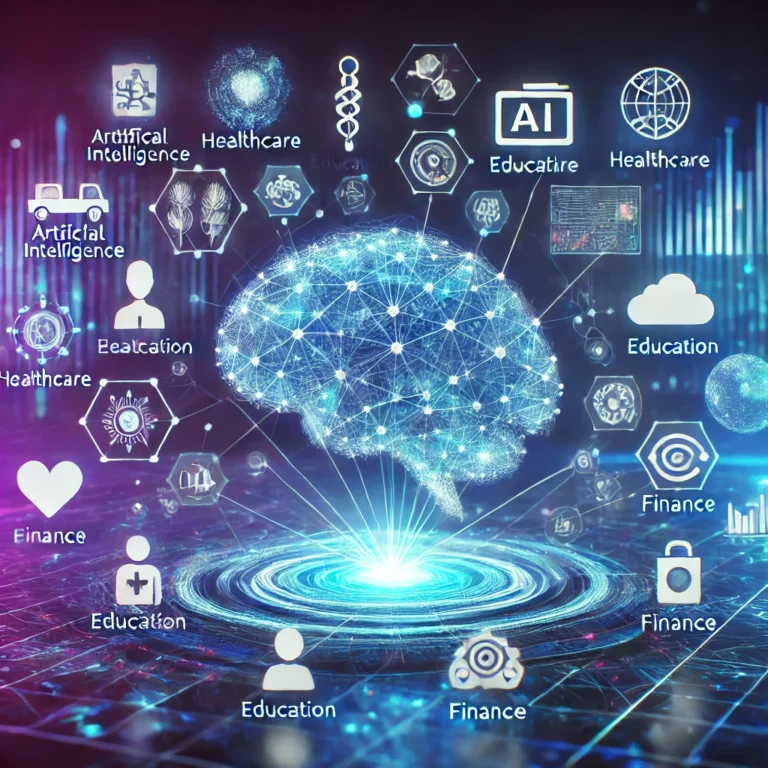Unlocking the Revolutionary Power of Generative AI: Transforming Medicine, Education, and Personalized Experiences
Introduction to Generative AI
Generative AI, a subset of artificial intelligence, refers to algorithms that can generate new content, data, or information that resembles existing forms. Unlike traditional AI systems, which primarily focus on recognizing patterns, making predictions, or categorizing data, generative AI allows for the synthesis of entirely new outputs. This distinct capability enables it to create not just variations of existing content but also original works, effectively blurring the lines between machine-generated and human-created material.
The emergence of generative AI has sparked significant interest across various industries. Initially prominent in creative fields such as art and music, it has rapidly transcended these boundaries, proving its applicability in areas like medicine and education. For instance, in healthcare, generative AI can assist in drug discovery by simulating molecular interactions, thus accelerating the development of new therapies. Similarly, in educational settings, it can create personalized learning materials tailored to the unique needs of each student, enhancing engagement and knowledge retention.

This transformative potential of generative AI is a catalyst for innovation, prompting organizations to rethink conventional methodologies. The technology operates on advanced neural networks, which are designed to learn from vast datasets, enabling them to generate high-quality outputs that can mimic human creativity and cognitive processes. By harnessing this capability, industries can improve efficiency, foster creativity, and achieve outcomes that were previously unimaginable.
As generative AI continues to evolve, its implications extend far beyond mere content creation. By integrating this technology into various workflows, sectors including healthcare, education, entertainment, and beyond stand to benefit from increased innovation and enhanced user experiences. The ongoing exploration of generative AI signifies not just a technological leap but a paradigm shift in how we approach problem-solving and creativity across diverse fields.
Generative AI in Medicine
Generative AI is increasingly transforming the medical field by introducing innovative methodologies that enhance various processes, particularly in drug discovery, diagnostic imaging, and personalized treatment plans. One of the most compelling applications of generative AI is its ability to accelerate drug discovery through advanced predictive modeling. By analyzing vast datasets, generative AI can predict molecular properties, facilitating the identification of new drug candidates. This capability significantly reduces the time and cost associated with traditional drug development, allowing researchers to expedite the journey from discovery to clinical trials.
Moreover, generative AI plays a crucial role in improving diagnostic imaging. The technology processes and analyzes imaging data with remarkable precision, helping radiologists enhance their evaluations. Through sophisticated algorithms, generative AI offers insights that might otherwise be missed, ensuring a more accurate diagnosis. For instance, by identifying patterns in imaging scans, it can assist in the early detection of diseases, such as cancer, which can be critical in increasing patient survival rates.

In addition to these advancements, generative AI is vital in creating personalized treatment plans that cater specifically to individual patients. Utilizing patient data—such as genetic profiles, medical histories, and lifestyle factors—generative AI algorithms devise tailored healthcare solutions. This personalized approach not only improves the effectiveness of treatment but also minimizes adverse effects, as interventions can be customized based on a patient’s unique characteristics.
In summary, the integration of generative AI in medicine is revolutionizing the sector, fostering advancements in drug discovery, enhancing diagnostic imaging, and enabling personalized healthcare. As technology continues to evolve, its role in the medical field is expected to expand, leading to improved patient outcomes and a more efficient healthcare system overall.
Transforming Healthcare through AI-Assisted Diagnostics
Generative AI is revolutionizing the healthcare sector, particularly in the realm of diagnostic processes. By leveraging advanced algorithms and machine learning, AI tools are enhancing diagnostic imaging, which is crucial for accurate disease identification and effective treatment planning. In specialties such as radiology and pathology, generative AI technologies are employed to support healthcare professionals in analyzing complex data sets.
In radiology, for instance, AI algorithms can evaluate medical images with remarkable speed and precision. These tools assist in identifying abnormalities such as tumors, fractures, or other pathologies that may not be readily apparent to the human eye. Machine learning models are trained on vast datasets of annotated images, enabling them to recognize patterns and anomalies that can be critical for early diagnosis. This capability not only increases the overall efficiency of the diagnostic process but also reduces the likelihood of human error, thereby improving patient outcomes.
Pathology is another area where generative AI is making significant strides. AI systems can analyze histopathological slides and highlight regions of interest that may indicate disease. By automating the initial assessment, pathologists can focus their expertise on confirming diagnoses and determining the best course of treatment. This enhancement in the diagnostic workflow leads to quicker results for patients, which is essential for conditions that require timely intervention.
The implications of AI-assisted diagnostics extend beyond mere efficiency; they foster a more accurate healthcare system that can personalize treatment according to individual patient needs. As generative AI continues to evolve, its role in diagnostics will likely expand, paving the way for innovative approaches to disease detection and monitoring. Healthcare providers that adopt these technologies stand to benefit from improved diagnostic accuracy and enhanced patient care.
Generative AI in Education
The advent of generative AI has the potential to significantly transform the educational landscape, creating a multitude of opportunities for personalized learning and engagement. One of the most notable applications of generative AI in education is the ability to create tailored learning materials that cater to the unique needs and preferences of individual students. By analyzing a student’s performance, learning style, and interests, AI systems can generate customized content, such as quizzes, study guides, and supplementary reading that align with the learner’s specific objectives.
Moreover, generative AI facilitates the development of virtual tutoring systems. These AI-driven platforms can simulate one-on-one interactions with students, providing immediate feedback and assistance. By leveraging natural language processing and machine learning, these virtual tutors can help clarify confusing concepts, guide students through problem-solving processes, and enhance overall comprehension. This ensures that learners receive support at their own pace, allowing them to grasp challenging material more effectively.
Gamification is another compelling application of generative AI in education. By incorporating game-like elements and environments, AI can make learning more enjoyable and engaging. This approach not only motivates students to participate actively in their education but also fosters a deeper understanding of the subject matter. Generative AI can create dynamic scenarios and challenges tailored to the student’s progress, promoting problem-solving skills and critical thinking.
In language learning, generative AI tools offer valuable assistance by generating conversational scenarios and immersive experiences. These applications can adapt to the learner’s proficiency level, ensuring appropriate exposure to new vocabulary and grammar structures. Such personalized language learning tools help address individual challenges, making the acquisition of new languages more effective and enjoyable. The integration of generative AI into education, therefore, holds significant promise for enhancing personalized experiences, fostering engagement, and addressing the diverse needs of learners.
Creating Personalized Learning Experiences
The advent of generative AI has greatly impacted the landscape of education, offering the potential to create highly personalized learning experiences for students. By utilizing sophisticated algorithms and machine learning techniques, educational platforms are now able to adapt to individual performance metrics and learning preferences, ensuring that each learner’s journey is unique and effective.
One notable example of such technology is the use of adaptive learning platforms. These platforms, powered by generative AI, assess a student’s strengths and weaknesses in real-time, continuously recalibrating the curriculum based on their progress. This dynamic approach facilitates the customization of course content, providing personalized pathways that resonate with the varying learning styles of students. For instance, platforms like DreamBox Learning and Knewton are designed to present tailored lessons that adjust difficulty levels, helping to maintain engagement and promote mastery of subjects.
Moreover, generative AI also supports the development of intelligent tutoring systems, which offer real-time feedback and one-on-one assistance, akin to having a personal tutor. These systems can analyze individual responses to problems and adaptively suggest resources, exercises, or strategies to improve understanding. This kind of individualized support is essential in accommodating diverse educational needs, making learning more inclusive and effective.
The integration of generative AI in education further extends to creating immersive learning experiences through virtual and augmented reality. Platforms like Oculus for Business leverage AI to tailor environments and scenarios in which students can interactively engage with content, fostering deeper understanding and retention. These personalized experiences not only enhance traditional curricula but also contribute to a more engaging learning environment.
In summary, generative AI technologies are rapidly transforming the educational sector by facilitating the creation of personalized learning experiences. Through adaptive platforms and intelligent tutoring systems, students can navigate their learning journeys more effectively, aligning education with their individual strengths and ensuring a more inclusive approach to learning.
Generative AI in Personalized Experiences
Generative AI is significantly transforming the realm of personalized experiences across various sectors, including e-commerce, entertainment, and healthcare. By leveraging advanced algorithms and large datasets, this technology enables businesses to create highly tailored interactions that resonate with individual preferences and needs. In e-commerce, for instance, generative AI can analyze a customer’s browsing history, purchase patterns, and preferences to provide product recommendations that are specifically suited to the user. This level of personalization not only enhances consumer satisfaction but also fosters loyalty, as customers are more likely to return to platforms that understand their preferences.
In the entertainment industry, generative AI can curate content recommendations based on a user’s viewing habits, allowing streaming services to suggest films or series that align closely with their interests. By analyzing past consumption patterns and integrating user feedback, AI systems can generate customized watchlists that evolve over time, ensuring that viewers always have access to content that entertains and engages them.

Moreover, in the healthcare sector, generative AI plays a pivotal role in enhancing patient support experiences. Through sophisticated algorithms, AI can provide personalized health recommendations, lifestyle suggestions, and even reminders for medication adherence. This personalized approach not only improves patient engagement but also empowers individuals to take proactive steps in managing their health.
The integration of generative AI into these sectors showcases its potential to create more satisfying and engaging consumer experiences. By tailoring interactions and recommendations, businesses can foster deeper connections with their customers, ultimately leading to improved outcomes and stronger brand loyalty. As generative AI continues to evolve, its influence on personalized experiences is expected to expand, driving further innovations that reshape customer engagement strategies across various industries.
Challenges and Ethical Considerations
The integration of generative AI within various fields, such as medicine and education, presents significant challenges and raises important ethical considerations. One of the foremost concerns is privacy. As generative AI systems often rely on large datasets, the handling of personal and sensitive information can lead to potential breaches of confidentiality. Ensuring that data used in AI applications are secure and that individuals’ privacy rights are respected is paramount to maintaining public trust and legal compliance.
Another pressing issue is the inherent bias that can exist within AI algorithms. These biases can stem from the data that the models are trained on, which may reflect societal prejudices or inconsistencies. If not addressed, biased algorithms can perpetuate discrimination and inequality, leading to adverse outcomes in fields such as healthcare where decisions made by AI could unfairly impact certain demographic groups. It is crucial to develop and implement strategies that reduce bias manifesting in AI systems, fostering fairness and equity in their applications.
The potential for misuse of generative AI technology is an additional concern. Malicious actors might leverage AI for unethical applications, including the creation of deepfakes, misinformation, or unauthorized surveillance. The implications of such misuse can have severe repercussions on individual rights and societal norms. To mitigate these risks, a well-defined regulatory framework is essential, establishing guidelines and accountability measures for AI developers and users.
In conclusion, the deployment of generative AI presents various challenges and ethical dilemmas that must be addressed to harness its full potential responsibly. By focusing on privacy, bias reduction, and regulating usage, we can foster an environment where generative AI technologies contribute positively to society while minimizing risks. Such thoughtful engagement will help ensure that these transformative tools benefit all stakeholders fairly and equitably.
Future Potential of Generative AI
The future of generative AI holds significant promise across various domains, particularly in medicine, education, and personalized experiences. As technology advances, we can expect to see more sophisticated models that enhance the capabilities of professionals and enrich user experiences. One of the emerging trends is the integration of generative AI with other technologies, such as augmented reality (AR) and virtual reality (VR). This combination could create immersive learning environments in education, allowing students to engage with content in ways previously unconceived.
In the medical field, generative AI is poised to revolutionize diagnostics and treatment planning. With advancements in machine learning algorithms, AI systems can analyze vast datasets, leading to more accurate predictions of patient outcomes and tailored treatment options. The potential for generative AI to contribute to drug discovery is also noteworthy, as it could expedite the development of new therapies by simulating molecular interactions and identifying promising compounds more efficiently.
Furthermore, the role of generative AI in promoting sustainability is gaining traction. By enabling more efficient resource management and optimizing production processes, AI can contribute to environmental conservation initiatives. The development of smart cities, driven by generative AI technologies, could lead to better energy management and reduced waste, thereby enhancing urban living standards while minimizing ecological footprints.
The ethical considerations surrounding the use of generative AI will also shape its future. Ongoing research is crucial to address concerns about bias, privacy, and accountability in AI systems. These discussions will facilitate the responsible integration of generative AI into society, ensuring that advancements benefit humanity while adhering to ethical standards.
In conclusion, the future potential of generative AI is expansive, with its impact likely to redefine how we interact with technology across various sectors. As we continue to explore and innovate, the possibilities for generative AI to enhance human capabilities and improve quality of life remain boundless.
Conclusion
Generative AI has emerged as a powerful force in various sectors, fundamentally altering the landscapes of medicine, education, and personalized experiences. By automating complex processes and generating new content, this innovative technology enhances efficiency and fosters creativity. In the medical field, for instance, generative AI can analyze vast datasets to aid in diagnosis and treatment planning, thereby improving patient outcomes and streamlining healthcare delivery. Similarly, in education, it offers tailored learning experiences, catering to individual student needs and promoting a more inclusive educational environment.
Moreover, the applications of generative AI extend to creating personalized experiences across diverse industries, driven by its ability to comprehend and predict user preferences. Businesses can harness this technology to design marketing strategies that resonate with their audiences, ultimately leading to greater customer satisfaction and engagement. As generative AI continues to advance, its impact will likely expand further, paving the way for innovative solutions that transcend current limitations.
However, while the advancements in generative AI are promising, it is crucial for individuals and organizations to remain vigilant about the ethical implications and challenges that may arise. Issues such as data privacy, misinformation, and bias must be addressed to ensure that the benefits of this technology are realized responsibly. Understanding the breadth of generative AI applications beyond its creative aspects is vital for navigating its rapidly evolving landscape.
As we move forward, it is essential for stakeholders across various fields to stay informed about developments in generative AI and their implications for the future. By embracing informed discussions and fostering collaboration, society can better harness the transformative potential of generative AI, leading to improved outcomes in medicine, education, and beyond.
Medicine: Link to research papers or articles on AI in drug discovery or diagnostics. Example: AI in Medicine – Nature
Education: Link to resources on how AI is personalizing learning. Example: AI and Education – EdTech Magazine
Personalized Experiences: Link to case studies or news on how AI enhances customer experiences. Example: AI in Personalization – MIT Sloan Management Review
- The Role of Artificial Intelligence in Cybersecurity: Revolutionizing Digital Defense
- Cybersecurity Ultimate Innovations in the Face of Growing Threats
- Quantum Computing in 2025: Disrupting the Hype vs Reality
- Top AI Tools You Should Know in 2025
- Deep Seek: The Revolutionary AI Transforming Search Forever
What is Generative AI’s?

Generative AI’s refers to artificial intelligence models that can create new content, such as text, images, music, and even videos, by learning from existing data. Technologies like GPT (for text) and GANs (for images) are examples of generative AI’s.
How is Generative AI’s transforming medicine?

Generative AI’s is revolutionizing medicine by assisting in drug discovery, predicting patient outcomes, generating personalized treatment plans, and enhancing medical imaging for better diagnostics.
What role does Generative AI’s play in education?

Generative Ai’s personalizes learning experiences by creating adaptive content, generating practice exercises, summarizing lessons, and even providing instant feedback through AI-powered tutors.
Can Generative AI’s improve personalized user experiences?

Yes, Generative AI’s tailors user experiences by analyzing data to create highly customized recommendations, virtual assistants, or interactive content that aligns with individual preferences.
What are some real-world applications of Generative AI’s?

Applications include generating realistic images in art and design, creating natural-sounding text for chatbots, assisting in code generation for software developers, and even composing music or writing books.
Is Generative AI’s safe to use in critical fields like medicine?

Generative AI’s is generally safe when deployed responsibly. However, strict ethical guidelines, human oversight, and data privacy measures are essential to minimize risks and errors.
How does Generative AI enhance productivity in industries?

Generative AI’s automates repetitive tasks, accelerates content creation, aids in brainstorming with AI-generated suggestions, and streamlines workflows across various industries.
What are the ethical concerns surrounding Generative AI’s?

Ethical concerns include bias in AI outputs, misuse for generating fake content (e.g., deepfakes), data privacy issues, and the potential loss of jobs in certain sectors.
How can businesses implement Generative AI’s effectively?

Businesses should start by identifying processes that could benefit from automation or creativity, invest in quality data collection, and work with AI experts to build or adopt suitable generative AI’s solutions.
What does the future hold for Generative AI’s?
The future of Generative AI’s includes more advanced models, broader applications across industries, improved ethical standards, and seamless integration with human creativity to unlock unprecedented potential.





